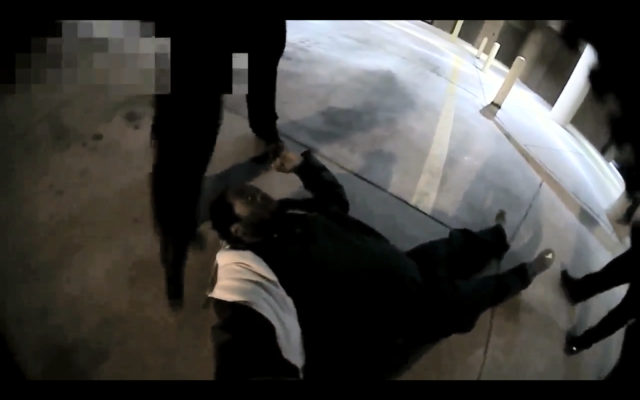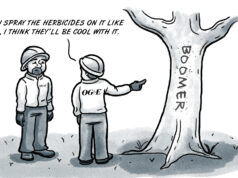
While other hot-button topics may have overtaken the forefront of America’s public consciousness, the actions of police officers that result in unnecessary deaths should still trouble everyone.
The January death of Norman transient Marconia Kessee troubles us greatly.
On Jan. 16, the 34-year-old Kessee died in the Cleveland County Jail after Norman Police Department officers arrested him at Norman Regional Hospital. With a history of mental illness, Kessee had been discharged from the hospital but had lingered in a wheelchair, his speech impeded, shaking as he moved and unable to stand up.
Body camera footage published by the Norman Transcript shows officers Kyle Canaan and Daniel Brown quickly lost patience with Kessee, accused him of faking his condition, repeatedly cussed at him and belittled him in the final hours of a life they failed to help save.
Flanked by an unidentified hospital security officer, the pair of Norman’s finest ultimately dragged the scared, sick man across a concrete walkway, off a curb and into a police vehicle.
One officer appeared to express amusement that Kessee’s “bare butt” was scraping the sidewalk.
Officer: ‘Get over yourself’
The 22-minute police body camera footage of Kessee’s trespassing arrest is painful to watch. Canaan and Brown talk down to the troubled man with an insensitive arrogance that taints their profession. The officers’ statements are thick with cynicism, and they refer to Kessee’s apparent psychosis and other unknown ailments as “bullshit,” at one point telling him to “get over yourself” and walk across the street to the homeless shelter.
“Are you just putting on a show so you can have somewhere to stay?” one of the officers asks as Kessee shakes and falls while trying to stand.
“You can’t just act like this to get back in the hospital,” another officer says. “That’s not how it works.”
The officers repeatedly express disbelief that the man was ill.
“You can stop with the show,” one officer says.
“It ain’t fooling a single person, I can tell you that,” another replies.
As the pair of Norman police officers lay hands on a screaming Kessee, one notes: “I’m not above dragging you off this property.”
Indeed, as that is exactly what the policemen do, telling an onlooker that they are treating Kessee “… like a small child who doesn’t want to listen.”
Two hours later, Kessee was dead.
Hospital and officers at fault
The press, the public and NPD Chief Keith Humphrey are still waiting for the Office of the Chief Medical Examiner and the Oklahoma State Bureau of Investigation to conclude their reports on Kessee’s death.
Concerned community members in Norman have called for action in the matter, some asking for hospital administrators to resign and some proposing a new community advisory board to ameliorate relationships with the oft-criticized police department.
To be sure, both public institutions designed to help Norman’s citizens failed Marconia Kessee and the greater community. The hospital did not treat Kessee as a patient whose life mattered, and the two Norman police officers exhibited a breathtaking ignorance of proper skills for helping someone who is experiencing a mental health crisis. While the officers’ actions are more heinous, the hospital’s abdication of responsibility is pathetic as well.
If Norman Police Chief Keith Humphrey wants to offer his community more than mere words, he will take action when the investigation of officers Canaan and Brown has concluded. The pair is currently on paid leave. Their documented actions and attitudes show that they do not deserve to serve the city of Norman.
As a result, the terminations of their careers would be a win-win. The community would be safer knowing that accountability exists in its police department, and Humphrey would be able to deliver a message about what standards he expects for the men and women he employs to serve and protect.
Plus, being forced to resign could go a long way toward helping Canaan and Brown get over themselves.





















